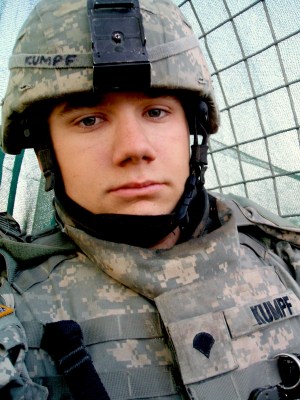I look down and I see my combat boots walking over the dust-filled rocky landscape again.
I feel like I am over-heating under the weight of my kit.
The sun is so bright, and the sound of the rocks rubbing together sends shivers shooting through my body.
Suddenly there is a car coming down the entry control point: siren goes off, pen flare fired.
I’m up against the Hesco barrier. I look down the top of my rifle, through my ACOG and: wait.
Control your breathing, I tell myself, deep breaths: warning shot, disabling shot; I pull the trigger.
As I lunge up in my bed I wonder why this is all happening again. Why I am having yet another nightmare? Sweat rolls off my body as I regain control of my breathing, looking around the room to ensure I am actually awake just as I have done so many times before. No one is here to witness this nightmare; I’m sitting in a barracks room at a Warrior Transition Unit in Maryland.
For five years I ignored that I was suffering internally from my service in Iraq. Rather than face that fact that I needed help I choose to “carry on” as I was taught to do as a soldier. I pushed myself constantly; I felt only anger and guilt as I had convinced myself I did not deserve to be standing there as I had not done enough during my service. I held others to high standards, myself to even higher ones.
When I fell short, there were no feelings of “Well, you did all right.” It was simply failure. When I found myself divorced, in trouble and out of a job, I did what I do best—I volunteered to go back on active-duty orders. Soon those orders ended and I found myself back in college burying myself into my studies, still deflecting any sense of urgency in having to deal with what is commonly known as post-traumatic stress disorder.
As with all things, burying myself in school work and other activities was simply not enough to quell the intrinsic need to go back to war, so I volunteered once again, finding myself in Afghanistan. Soon after arrival, I started experiencing more nightmares and mood swings. I found that I was volunteering for each and every opportunity to get away from my unit, a headquarters company, and go outside where things would be more dangerous.
My tour in Afghanistan ended abruptly when I began to sleepwalk following months of violent fits of nightmares, as well as ingesting malaria and anti-anxiety medications as prescribed which, some medical sources believe cause side effects, including vivid dreams. The feeling of leaving your fellow soldiers in the middle of a deployment was one of incomparable guilt and failure.
My medical evacuation was about as routine as they come, finding myself at Fort Meade’s Warrior Transition Unit within a week.
After initial in-processing with the WTU, I was sent over to behavioral health where I was seen by a psychologist, and then a psychiatrist, who both told me that I did not meet the criteria for PTSD due to the fact that I did not “actively seek to avoid” situations that might trigger a reaction. I was then shuffled off to Walter Reed National Military Medical Center where I was put through a battery of tests that found that I had severe PTSD.
After these tests, I requested to be seen by an orthopedics provider and a neurologist to solve my painful legs and back, and the constant migraine headaches since experiencing a minor traumatic brain injury in Iraq. For nearly five months I sat in Maryland, separated from my second wife and family, going to one 45-minute appointment per week for behavioral health.
When I assumed responsibility for scheduling my own appointments, I was berated by a nurse case manager for not “following the program.” This was often accompanied by threats of a delayed transfer to a community-based program near my wife, so that I could continue my care without being away from my support system.
I finally hit the wall in December 2012 when my wife and I visited Arlington National Cemetery.
It was the first time I had been there since I enlisted.
Walking through the rows of Section 60, I knew too many names.
Soon, I began to feel the emotions I had been avoiding for years.
I had spent five exhausting years running away from all of the thoughts now rushing through my head, five years being told by the Veterans Administration that I was not “bad enough” to receive more than 30% benefits; five years single- handedly destroying everything positive in my life.
I had spent five years pushing myself to see how much I could take before I would finally go too far. This struggle was my own; I cared not to share it with anyone as I felt few could possibly understand. I had spent five years fighting an enemy that was within my own mind.
It took five years, two deployments, a trip to Arlington and the suicidal death of the only mental health provider who ever made me feel better, Captain Pete Linnerooth.
Captain Linnerooth, a man who wrote professionally about the dangers of an overwhelmed behavioral health force in the military, had helped an untold number of soldiers while he served as 2nd BCT/1st Infantry Division psychologist from 2006 to 2007.
Two days into 2013 and five years since we had returned from Iraq, Pete Linnerooth took his own life.
To many his death symbolized the struggle that returning veterans face once out of uniform. Pete Linnerooth had fallen victim to the professional burn out he had wrote about and had become another statistic in a growing trend he fought so hard to stop. After all, if the shrink could not find a way to deal with it all where did that leave the rest of us?
It took all of this for me to realize that I was standing at on an icy edge with a single foot. I had spent five years fighting a third war in my mind; a battle that the Army abandoned through a non-sense “suicide prevention” program and a woefully lacking transition program , a battle that the Veterans Administration has wrapped tightly in red tape and delays. We are failing our veterans, losing them by the hundreds each year for nothing more than lack of support from the government they served so faithfully.
Rob Kumpf is a combat veteran of the wars in Iraq and Afghanistan, where he served with the U.S. Army. He attends Norwich University in Vermont where he majors in Studies in War and Peace.



